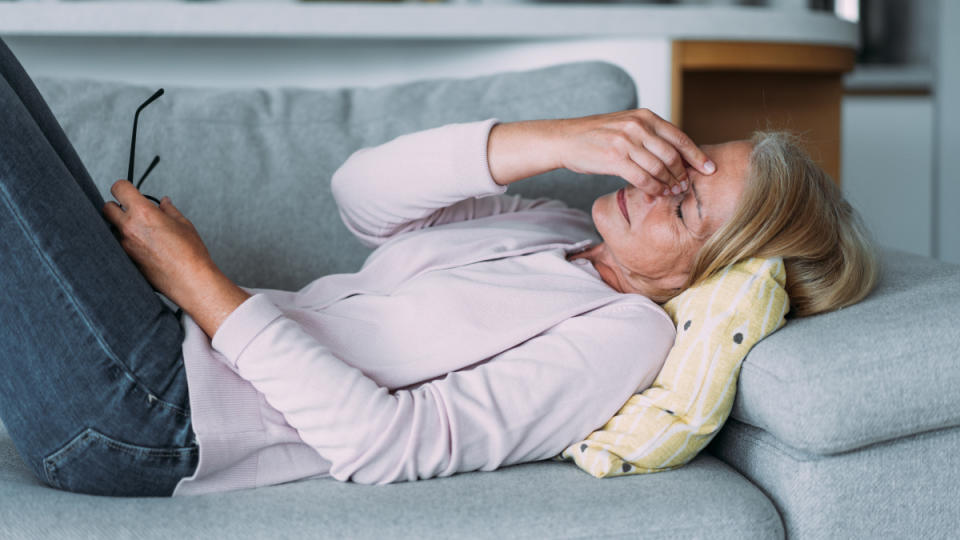Is Falling Asleep After Eating a Sign of Diabetes? It Can Be — Here’s How To Tell
We’ve all fallen into the occasional food coma after a big family feast or bottomless brunch. But if dozing off after meals becomes a daily occurrence, you might start to worry. After all, fatigue is known to be a type 2 diabetes symptom. So is falling asleep after eating a sign of diabetes? It might be — but there are a few other possible explanations, too. Here’s what the experts want you to know.
The two main types of diabetes
Diabetes is a condition in which your body has trouble using glucose for energy. When everything is humming along smoothly, a hormone called insulin shuttles glucose into your cells to be used for energy. But people with diabetes either don’t produce enough insulin or their body doesn’t use it efficiently. This can lead to dangerously high blood sugar levels. If diabetes isn’t managed properly, it can become a life-threatening condition.
Aside from gestation diabetes, which can occur during pregnancy, there are two main types of diabetes:
Type 1 diabetes is an autoimmune condition in which the immune system attacks the cells in the pancreas that produce insulin. Without insulin, glucose can’t enter cells efficiently and builds up in the bloodstream instead. This type of diabetes is most likely to develop during childhood or adolescence.
Type 2 diabetes is a condition in which the cells don’t respond normally to insulin, also known as insulin resistance. This type of diabetes typically develops in adults middle age and older, and it may be linked to ultra-processed foods. “When you’re eating a diet that has a lot of processed foods, your pancreas is constantly working to pump out insulin to deal with the sugar spikes,” explains Terri DeNeui, DNP, a board-certified nurse practitioner, hormone health expert and founder of EVEXIAS Health Solutions. “Over time, patients get resistant to the insulin. Your body’s not utilizing glucose for fuel effectively.”
Type 2 diabetes is incredibly common in the U.S. It’s estimated that 1 in 10 Americans have diabetes, and type 2 diabetes accounts for up to 95% of cases. So if you notice symptoms, it’s always worth talking to your doctor. Check out the video below for more on the differences between type 1 and type 2 diabetes.
Related: These 9 Simple (and Delicious!) Food Swaps Significantly Lower Diabetes Risk, Say MDs
Symptoms of type 2 diabetes
Common symptoms of diabetes include:
Frequent urination, especially at night
Excessive thirst or hunger
Fatigue
Blurred vision
Unexplained weight loss
Numbness or tingling in the hands or feet
Dry skin
Slower-than-usual healing time
Note: These symptoms can be mild, and some people have type 2 diabetes for years before they experience any noticeable symptoms. That's just one more reason to keep up with your annual wellness checkups, which typically include blood glucose testing.
Related: Reverse Prediabetes Without Depriving Yourself? Yes! Experts Share Their Best Tips
Is falling asleep after eating a sign of diabetes?
Maybe you’re worried because you’ve been nodding off at your desk after lunch every day. Or you curl up on the couch after dinner, and before you know it, you’re sound asleep. Since fatigue can be a symptom of diabetes, you may wonder if falling asleep after eating is a sign of diabetes.
It’s possible. Type 2 diabetes can make you feel sluggish after a meal because it interferes with your body’s ability to use glucose for energy. “The brain’s primary fuel is glucose,” DeNeui explains. “If you’re not getting glucose into the cells very well, you’re going to feel really tired and want to go to sleep.” (Click through to see how the Dubrow Diet helps balance blood sugar to boost energy and speed weight loss.)

And because people with type 2 diabetes have trouble regulating blood sugar, they may experience more dramatic spikes and crashes after eating. Type 2 diabetes is also linked to sleep problems, which can make daytime drowsiness worse.
“Blood sugar fluctuations can disrupt your sleep, making it harder to wake up feeling refreshed in the morning,” says Raj Dasgupta, MD, Chief Medical Advisor at Sleep Advisor and a board-certified physician specializing in internal medicine, pulmonology and critical care. Type 2 diabetes is also associated with a higher risk of obstructive sleep apnea, which can wreak havoc on your sleep quality, he adds. And certain symptoms of diabetes — like frequent urination or nerve pain — can make it tough to get a full night’s rest.
Bottom line: If you're routinely groggy after meals, and you notice any of the above symptoms of diabetes, schedule a visit with with your doctor.
Related: Top MD: Easy Big-Breakfast Hack Helps Fight Diabetes and Boost Weight Loss After Age 50
When falling asleep after eating isn't a sign of diabetes: Common energy sappers
Now for some good news: Falling asleep after eating isn’t always a sign of diabetes. There are other factors that could be at play. Some of the most common culprits:
1. Sugar and carbs
Refined sugars and processed foods can cause blood sugar to spike and crash after a meal — even if you don’t have insulin resistance, DeNeui says. If you tend to reach for sugary snacks or carb-heavy meals, that alone could be the explanation for your post-meal sleepiness. “If you eat a well-balanced meal with protein, healthy fats and lower carbohydrates, people don’t tend to feel crummy or tired after that,” DeNeui adds.

2. Underlying conditions
Beyond type 2 diabetes, there are a few other conditions that could be making you feel tired during the day. “Daytime sleepiness can be caused by sleep disorders, medication side effects that keep you up at night or health issues like depression or anemia,” Dr. Dasgupta says. “Unmanaged stress and poor quality or quantity of sleep can also contribute to feeling un-refreshed and not well-rested in the morning. Finding out the reason behind why you feel so tired is important for feeling more awake during the day.” (Tossing and turning at night? Click through to see how ashwagandha can deepen sleep.)
3. A midday energy dip
If you often sluggish in the afternoon, you may just be dealing with the typical midday tiredness. “During this time, the body's circadian rhythm takes a dip,” Dr. Dasgupta notes. “Combined with post-lunch digestion, this can make you feel fatigued and less alert, causing decreased productivity and the desire to take a nap.”
If you’re worried that you may have type 2 diabetes, visit your doctor. A simple blood test can help diagnose diabetes or assess your risk of developing it down the road. Your doctor may also want to rule out other possible causes for fatigue, such as hormonal imbalances, depression or vitamin deficiencies. (Click through to see more sneaky causes — and cures — for an afternoon slump.)
5 ways to beat an afternoon slump
While it's true that falling asleep after eating can be a sign of diabetes, if your doctor has given you the all-clear, you're likely dealing with a simple afternoon slump. These tips help recharge your batteries when you’re feeling sluggish.
1. Drink a glass of water
Even mild dehydration can zap your energy level. In fact, research suggests losing as little as 1% of your body water can cause cognitive symptoms like fatigue, memory blips, moodiness and lack of concentration. To avoid zoning out after lunch, be sure to down a tall glass of H2O with your meal. And set reminders on your phone to sip throughout the day, too.

2. Stroll around the block
Not only does exercise boost your energy level, but spending 15 minutes in the sun each day helps your body synthesize vitamin D, which plays a key role in staving off fatigue. “Take short walks or stretch breaks to increase blood flow and oxygen to the body and brain, helping you feel more alert,” Dr. Dasgupta says. “Getting sunlight can also help you feel more energized.” (Click through to learn more about the link between a vitamin D deficiency and fatigue.)
3. Pair protein with fat
It's tempting to nosh on a handful of chips when you're sluggish and hunger pangs hit. But before you reach for a snack, make sure it includes both protein and healthy fats. “It’ll slow down the digestion of carbohydrates, and you won’t have that spike and drop-off,” DeNeui explains. One easy go-to: Grab a piece of fruit for a quick energy boost from natural sugars, then add a spoonful of peanut butter or a piece of cheese (which both contain fat) to slow digestion.

4. Indulge in a 'nappuccino'
Sometimes, the best way to restore your energy is to give in to your urge to nap. But if you do, keep it brief. About 15 to 20 minutes is the sweet spot to help you feel recharged and refreshed. If you snooze longer than half an hour, you’re likely to experience sleep inertia, a state of grogginess and confusion after you wake.
Tip: For an even more effective pick-me-up, consider a “coffee nap” or "nappuccino". Drinking a cup of coffee before a short snooze helps you feel even more alert when you wake, since the caffeine starts to kick in just as you wake.
5. Check your testosterone levels
Testosterone levels start to dip in your 40s and 50s, and that could be the surprising reason behind your midday blahs. “Afternoon fatigue is a hallmark symptom of suboptimal testosterone in both men and women,” DeNeui says. “If you’re hitting the wall between 2 and 4 pm, looking for that quick coffee or energy drink, that’s a good reason to get some blood levels checked.”
If your levels are low, your doctor can walk you through ways to bring them back into balance. That may include options such as pills, medicated patches or creams.
For more ways to stay energized and alert:
10 Sneaky Causes of an Afternoon Slump + Easy, Natural Ways To Boost Your Energy
Experts Say This Ancient Herb Can Help Rejuvenate a Weary Thyroid — And Your Energy
Study: 65% of Postmenopausal Women Are Deficient In Iron — How to Restore Your Levels & Your Energy
This content is not a substitute for professional medical advice or diagnosis. Always consult your physician before pursuing any treatment plan.

